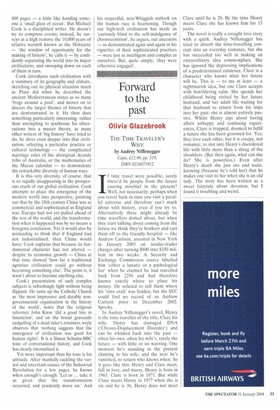Forward to the past
Olivia Glazebrook
THE TIME TRAVELER'S WIFE by Audrey Niffenegger Cape, £12.99, pp. 519, ISBN 0224071912
f time travel were possible, surely there'd be people from the future causing mischief in the present?
Well, not necessarily: perhaps when you travel back in time you visit a parallel universe and therefore can't muck about with history, even if you try to. Alternatively there might already be time travellers dotted about, but when they start talking about coming from the future we think they're bonkers and cart them off to the friendly hospital — like Andrew Carlssin, arrested in New York in January 2003 on insider-trader charges after turning $800 into $350 million in two weeks. A Security and Exchange Commission source labelled him 'either a lunatic or a pathological liar' when he claimed he had travelled back from 2256 and had therefore known exactly where to place his money. He refused to tell them where his 'time craft' was hidden, but the SEC could find no record of an Andrew Carlssin prior to December 2002. Spooky.
In Audrey Niffenegger's novel, Henry is the time traveller of the title, Clare his wife. Henry has damaged DNA (`Chrono-Displacement Disorder') and can be whisked back into the past — often his own, often his wife's, rarely the future — with little or no warning. One moment he's standing in the present chatting to his wife, and the next he's vanished, to return who knows when. So it goes like this: Henry and Clare meet, fall in love, and marry. Henry is born in 1963. Clare is born in 1971. But while Clare meets Henry in 1977 when she is six and he is 36, Henry does not meet
Clare until he is 28. By the time Henry meets Clare she has known him for 13 years.
The novel is really a straight love story with a quirk. Audrey Niffenegger has tried to absorb the time-travelling concept into an everyday romance, but she has succeeded too well in making an extraordinary idea commonplace. She has ignored the depressing implications of a predetermined existence. Clare is a character who knows what her future will be. This is — to me at least — a nightmarish idea, but one Clare accepts with bewildering calm. She spends her childhood being visited by her future husband, and her adult life waiting for that husband to return from his trips into her past: she is almost entirely passive. Whilst Henry zips about having albeit unhappy and confusing experiences, Clare is trapped, doomed to fulfil a future she has been groomed for. Yes, they love each other, but it is creepy, not romantic, to slot into Henry's disordered life with little more than a shrug of the shoulders. (But then again, what can she do? She is powerless.) Even after Henry's death she just sits and waits, knowing (because he's told her) that he makes one visit to her when she is an old lady. The story has been written as a sweet fairytale about devotion, but I found it troubling and weird.




























































































 Previous page
Previous page